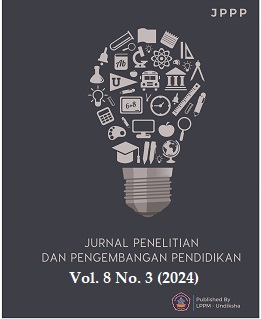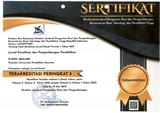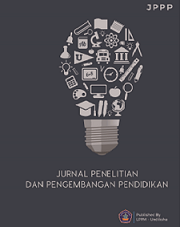Worksheet Based on Project-Based Learning in Science Learning in Elementary School
DOI:
https://doi.org/10.23887/jppp.v8i3.79951Keywords:
Worksheet Design, PjBL, Science Learning, Elementary StudentsAbstract
The underlying problem of this research is the lack of optimal application of teaching materials that can increase students' creativity and innovation, in accordance with 21st century skills. This study aims to test the practicality of Project-Based Learning (PjBL)-based worksheet design in science learning in elementary schools. The type of research used is development research using the 4-D model (Define, Design, Develop, Disseminate). The subject of this research involves design experts, material experts, technology experts, as well as teachers and students to test aspects of validity, practicality, and attractiveness. Data was collected through a non-test method in the form of a questionnaire that was quantitatively analyzed to evaluate product quality. The results of the study show that the average validation score of PjBL-based worksheets reaches 98%, indicating that this product is very valid. In addition, the results of the practicality test by teachers and students placed this worksheet in the very practical category. Based on these results, PjBL-based worksheets are declared feasible and effective to be used as teaching materials in elementary school learning. The implications of this study show that the development of PjBL-based teaching materials can be an innovative solution to improve the quality of learning in elementary schools.
References
Afrijal, Yulianti, D., Rohman, F., & Sunyono. (2023). STEAM-Based Science Student Worksheets to Improve Elementary School Students’ Scientific Literacy. Thinking Skills and Creativity Journal, 6(2), 94–105. https://doi.org/10.23887/tscj.v6i2.67152. DOI: https://doi.org/10.23887/tscj.v6i2.67152
Aiken, L. R. (1980). Content validity and reliability of single items or questionnaires. Educational and Psychological Measurement, 40(4), 955–959. https://doi.org/10.1177/001316448004000419. DOI: https://doi.org/10.1177/001316448004000419
Al-Busaidi, S., & Al-Seyabi, F. (2021). Project-based learning as a tool for student-teachers’ professional development: A study in an Omani EFL teacher education program. International Journal of Learning, Teaching and Educational Research, 20(4), 116–136. https://doi.org/10.26803/ijlter.20.4.7. DOI: https://doi.org/10.26803/ijlter.20.4.7
Alemneh, S., & Gebrie, G. (2024). The role of project-based learning in improving the writing ability and sub- writing abilities of 10th grade Amharic speaking students. Social Sciences and Humanities Open, 9, 1–9. https://doi.org/10.1016/j.ssaho.2024.100843. DOI: https://doi.org/10.1016/j.ssaho.2024.100843
Alghamdi, A. K., & Al-Ghamdi, N. A. (2021). Elementary teachers’ thoughts about distance education and learning 21st-century skills during covid pandemic. International Journal of Learning, Teaching and Educational Research, 20(3), 33–50. https://doi.org/10.26803/ijlter.20.3.3. DOI: https://doi.org/10.26803/ijlter.20.3.3
Alismail, H. A. (2023). Teachers’ perspectives of utilizing distance learning to support 21st century skill attainment for K-3 elementary students during the COVID-19 pandemic era. Heliyon, 9(9), 1–13. https://doi.org/10.1016/j.heliyon.2023.e19275. DOI: https://doi.org/10.1016/j.heliyon.2023.e19275
Amali, L. N., Zees, N., & Suhada, S. (2020). Motion Graphic Animation Video as Alternative Learning Media. Jambura Journal of Informatics, 2(1), 23–30. https://doi.org/10.37905/jji.v2i1.4640. DOI: https://doi.org/10.37905/jji.v2i1.4640
Arop, B. A., Umanah, F. I., & Effiong, O. E. (2015). Effect of instructional materials on the teaching and learning of basic science in junior secondary schools in Cross River State, Nigeria. Global Journal of Educational Research, 14(1), 67–73. https://doi.org/10.4314/gjedr.v14i1.9. DOI: https://doi.org/10.4314/gjedr.v14i1.9
Asri, D. N., Setyosari, P., Hitipeuw, I., & Chusniyah, T. (2017). The Influence of Project-based Learning Strategy and Self-regulated Learning on Academic Procrastination of Junior High School Students’ Mathematics Learning. American Journal of Educational Research, 5(1), 88–96. https://doi.org/10.12691/education-5-1-14. DOI: https://doi.org/10.12691/education-5-1-14
Ayaz, M. F., & Söylemez, M. (2015). The effect of the project-based learning approach on the academic achievements of the students in science classes in Turkey: A meta-analysis study. Egitim ve Bilim, 40(178), 255–283. https://doi.org/10.15390/EB.2015.4000. DOI: https://doi.org/10.15390/EB.2015.4000
Aydin, M. (2021). Investigating pre-service science teachers’ mobile augmented reality integration into worksheets. Journal of Biological Education, 55(3), 276–292. https://doi.org/10.1080/00219266.2019.1682639. DOI: https://doi.org/10.1080/00219266.2019.1682639
Ayyıldız, Y., Tarhan, L., & Gil, A. (2023). Comparing the effectiveness of the learning material and the learning method in students’ achievement in chemistry lesson on chemical changes. Research in Science & Technological Education, 41(4), 1372–1393. https://doi.org/10.1080/02635143.2022.2086535. DOI: https://doi.org/10.1080/02635143.2022.2086535
Basri, N., Salija, K., Baa, S., & Muhammad, A. P. A. (2024). Unlocking Creativity and Engagement in Students through Project-Based Learning. Journal of Hunan University Natural Sciences, 51(1), 112–120. https://doi.org/10.55463/issn.1674-2974.51.1.11. DOI: https://doi.org/10.55463/issn.1674-2974.51.1.11
Beagon, Ú., Niall, D., & Ní Fhloinn, E. (2019). Problem-based learning: student perceptions of its value in developing professional skills for engineering practice. European Journal of Engineering Education, 4(6), 850–865. https://doi.org/10.1080/03043797.2018.1536114. DOI: https://doi.org/10.1080/03043797.2018.1536114
Biantoro, P. P., & Pertiwi, K. R. (2024). Development of IBSC (Investigation Based Science Collaborative) Based Student Worksheet on Human Respiratory System to Improve Science Literacy and Collaboration Skills of Grade XI Students. Jurnal Penelitian Pendidikan IPA, 10(9), 6473–6489. https://doi.org/10.29303/jppipa.v10i9.8560. DOI: https://doi.org/10.29303/jppipa.v10i9.8560
Bilgin, I., Karakuyu, Y., & Ay, Y. (2015). The effects of project based learning on undergraduate students’ achievement and self-efficacy beliefs towards science teaching. Eurasia Journal of Mathematics Science and Technology Education, 11(3), 469–477. https://doi.org/10.12973/eurasia.2014.1015a. DOI: https://doi.org/10.12973/eurasia.2014.1015a
Celik, E., Baki, G. O., & Isik, A. (2022). the Effect of Cluster Teaching With Worksheets on Students’ Academic Achievement in Distance Education. Turkish Online Journal of Distance Education, 23(3), 137–153. https://doi.org/10.17718/tojde.1137255. DOI: https://doi.org/10.17718/tojde.1137255
Chan, Z. C. (2017). A qualitative study on using concept maps in problem-based learning. Nurse Education in Practice, 24, 70–76. https://doi.org/10.1016/j.nepr.2017.04.008. DOI: https://doi.org/10.1016/j.nepr.2017.04.008
Chang, R. C., Chung, L. Y., & Huang, Y. M. (2016). Developing an interactive augmented reality system as a complement to plant education and comparing its effectiveness with video learning. Interactive Learning Environments, 24(6), 1245–1264. https://doi.org/10.1080/10494820.2014.982131. DOI: https://doi.org/10.1080/10494820.2014.982131
Chiang, C. L., & Lee, H. (2016). The Effect of Project-Based Learning on Learning Motivation and Problem-Solving Ability of Vocational High School Students. International Journal of Information and Education Technology, 6(9), 709–712. https://doi.org/10.7763/ijiet.2016.v6.779. DOI: https://doi.org/10.7763/IJIET.2016.V6.779
Çilingir Altiner, E. (2024). Exploring measurement estimation strategies through concept cartoons designed with Realistic Mathematics Education. Humanities and Social Sciences Communications, 11(1), 1–10. https://doi.org/10.1057/s41599-024-03067-5. DOI: https://doi.org/10.1057/s41599-024-03067-5
Dewi, A. K., Slamet, S. Y., Atmojo, I. R. W., & Syawaludin, A. (2022). The Influence of Interactive Digital Worksheets Based on Level of Inquiry Towards Science Process Skills in Elementary School. Pegem Egitim ve Ogretim Dergisi, 13(1), 251–258. https://doi.org/10.47750/pegegog.13.01.27. DOI: https://doi.org/10.47750/pegegog.13.01.27
Ekayana, A. A. G., Parwati, N. N., Agustini, K., & Ratnaya, I. G. (2024). Enhancing Creative Thinking Skills and Student Achievement: An Innovative Approach through Integrating Project-Based Learning with STEAM and Self-Efficacy. International Journal of Educational Methodology, 10(1), 923–935. https://doi.org/10.47750/pegegog.14.04.03. DOI: https://doi.org/10.47750/pegegog.14.04.03
Etop, E. E., Iboro, S. G., & Obogo, A. I. (2023). Influence of locally available instructional materials on biology students’ academic achievement in abak local government area of akwa ibom state, nigeria. Global Journal of Educational Research, 22(1), 81–87. https://doi.org/10.4314/gjedr.v22i1.9. DOI: https://doi.org/10.4314/gjedr.v22i1.9
Fardinelly, S., Slamet, A., & Susanti, R. (2024). Electronic Liveworksheet- Based LKS Teaching Materials for Middle School Science Learning. Journal of Educational Sciences, 8(1), 118–127. https://doi.org/10.31258/jes.8.1.p.118-127. DOI: https://doi.org/10.31258/jes.8.1.p.118-127
Fatchurahman, M. A. S. M., Della, H., & Setiawan, M. A. (2022). Development of animation learning media based on local wisdom to improve student learning outcomes in elementary schools. International Journal of Instruction, 15(1), 55–72. https://doi.org/10.29333/iji.2022.1514a. DOI: https://doi.org/10.29333/iji.2022.1514a
Fatmawati, F., Rivaldi, M., & Suhaeni, S. (2023). Development of Electronic Student Worksheets Based Local Potential to Enhance Students’ Science Learning Outcomes. JIPI (Jurnal IPA Dan Pembelajaran IPA), 7(1), 56–71. https://doi.org/10.24815/jipi.v7i1.29443. DOI: https://doi.org/10.24815/jipi.v7i1.29443
Ferrari, L., Macauda, A., Soriani, A., & Russo, V. (2020). Educational robotics and artificial intelligence education: what priorities for schools? Re-Open Journal per La Formazione in Rete, 20(3), 68–85. https://doi.org/10.13128/form-10038.
Finbråten, H. S., Grønlien, H. K., Pettersen, K. S., Foss, C., & Guttersrud, Ø. (2022). “Nursing students’ experiences with concept cartoons as an active learning strategy for developing conceptual understanding in anatomy and physiology: A mixed-method study”. Nurse Education in Practice, 65, 1–11. https://doi.org/10.1016/j.nepr.2022.103493. DOI: https://doi.org/10.1016/j.nepr.2022.103493
Firdaus, M. A., Jamal, M. Y. S., & Arifin, B. S. (2023). Improving Student Learning Outcomes Through Project-Based Learning in Islamic Religion Lessons. Tafkir: Interdisciplinary Journal of Islamic Education, 4(2), 241–254. https://doi.org/10.31538/tijie.v4i2.400. DOI: https://doi.org/10.31538/tijie.v4i2.400
Ghaisani, N. R. T., & Setyasto, N. (2023). The Development of Liveworksheets-Based Electronic Student Worksheets (E-LKPD) to Improve Science Learning Outcomes. Jurnal Penelitian Pendidikan IPA, 9(8), 6147–6156. https://doi.org/10.29303/jppipa.v9i8.4571. DOI: https://doi.org/10.29303/jppipa.v9i8.4571
Gomez-del Rio, T., & Rodriguez, J. (2022). Design and assessment of a project-based learning in a laboratory for integrating knowledge and improving engineering design skills. Education for Chemical Engineers, 40, 17–28. https://doi.org/10.1016/j.ece.2022.04.002. DOI: https://doi.org/10.1016/j.ece.2022.04.002
Gómez-Pablos, V. B., del Pozo, M. M., & Muñoz-Repiso, A. G. V. (2017). Project-based learning (PBL) through the incorporation of digital technologies: An evaluation based on the experience of serving teachers. Computers in Human Behavior, 68, 501–512. https://doi.org/10.1016/j.chb.2016.11.056. DOI: https://doi.org/10.1016/j.chb.2016.11.056
Hanipah, S., Florentinus, T. S., & Rifai, A. (2018). The Effectiveness of Problem Based Learning and Project Based Learning Model to Improve Natural Science Study Outcomes. Innovative Journal of Curriculum and Educational Technology, 7(1), 1–6. https://doi.org/10.15294/ijcet.v7i1.24383.
Hasanah, H., Desniarti, D., & Siregar, N. (2022). Increasing Student Creativity through Project Based Learning Models in Thematic Learning. Literature for Social Impact and Cultural Studies, 4(3), 1116–1121. https://doi.org/10.37010/lit.v4i3.1044. DOI: https://doi.org/10.37010/lit.v4i3.1044
Hasni, A., Bousadra, F., Belletête, V., Benabdallah, A., Nicole, M. C., & Dumais, N. (2016). Trends in research on project-based science and technology teaching and learning at K–12 levels: a systematic review. Studies in Science Education, 52(2), 199–231. https://doi.org/10.1080/03057267.2016.1226573. DOI: https://doi.org/10.1080/03057267.2016.1226573
Hayati, H. N., & Desstya, A. (2023). Science Learning by Utilizing Natural Resources at Kak Seto’s Homeschooling. Scaffolding: Jurnal Pendidikan Islam Dan Multikulturalisme, 5(2), 485–505. https://doi.org/10.37680/scaffolding.v5i2.3111. DOI: https://doi.org/10.37680/scaffolding.v5i2.3111
Herlanti, Y., Mardiati, Y., Rahmawati, R., Putri, A. M. K., Jamil, N., Miftahuzzakiyah, M., & Sugiarti, S. (2019). Finding learning strategy in improving science literacy. Jurnal Penelitian Dan Pembelajaran IPA, 5(1), 59–71. https://doi.org/10.30870/jppi.v5i1.4902. DOI: https://doi.org/10.30870/jppi.v5i1.4902
Herlina, K. (2021). Developing electronic student worksheet (E-Worksheet) based project using Fliphtml5 to stimulate science process skills during the Covid-19 pandemic. Integrative Science Education and Teaching Activity Journal, 2(1), 59–73. https://doi.org/10.21154/insecta.v2i1.2555. DOI: https://doi.org/10.21154/insecta.v2i1.2555
Indriayu, M. (2018). The Influence of Science Literacy-Based Teaching Material Towards Science Achievement. International Journal of Evaluation and Research in Education, 7(3), 182–187. https://doi.org/10.11591/ijere.v7i3.14033. DOI: https://doi.org/10.11591/ijere.v7i3.14033
Julian, P. K. (2017). The effects of a project-based course on students’ attitudes toward mathematics and students’ achievement at a two-year college. Mathematics Enthusiast, 14(1), 509–516. https://doi.org/10.54870/1551-3440.1408. DOI: https://doi.org/10.54870/1551-3440.1408
Karamustafaoğlu, O., & Pektaş, H. M. (2023). Developing students’ creative problem solving skills with inquiry-based STEM activity in an out-of-school learning environment. Education and Information Technologies, 28(6), 7651–7669. https://doi.org/10.1007/s10639-022-11496-5. DOI: https://doi.org/10.1007/s10639-022-11496-5
Kitikidou, K., Milios, E., Stampoulidis, A., Pipinis, E., & Radoglou, K. (2024). Using Biodiversity Indices Effectively: Considerations for Forest Management. Ecologies, 5(1), 42–51. https://doi.org/10.3390/ecologies5010003. DOI: https://doi.org/10.3390/ecologies5010003
Kong, S. C., Cheung, M. Y. W., & Tsang, O. (2024). Developing an artificial intelligence literacy framework: Evaluation of a literacy course for senior secondary students using a project-based learning approach. Computers and Education: Artificial Intelligence, 6, 1–11. https://doi.org/10.1016/j.caeai.2024.100214. DOI: https://doi.org/10.1016/j.caeai.2024.100214
Kumi-Manu, R. N. (2021). Concept Cartoon as a Teaching Technique for Conceptual Change: A Ghanaian Junior High School Experience. American Journal of Educational Research, 9(9), 587–599. https://doi.org/10.12691/education-9-9-5. DOI: https://doi.org/10.31686/ijier.vol9.iss9.3352
Kurniawati, W., Umardianti, U., Novitasari, R. K., & Al Husna, A. (2024). Differentiated Science Student Worksheets : What is the Level of Collaboration Skills of Students of the Elementary School Teacher Education Study Program? Jurnal Kependidikan: Jurnal Hasil Penelitian Dan Kajian Kepustakaan Di Bidang Pendidikan, Pengajaran Dan Pembelajaran, 10(2), 627. https://doi.org/10.33394/jk.v10i2.11279. DOI: https://doi.org/10.33394/jk.v10i2.11279
Kwangmuang, P., Jarutkamolpong, S., Duangngern, P., Gessala, N., & Sarakan, P. (2024). Promoting analytical thinking skills development in elementary school students through animated cartoons. Computers in Human Behavior Reports, 15, 1–11. https://doi.org/10.1016/j.chbr.2024.100467. DOI: https://doi.org/10.1016/j.chbr.2024.100467
Lee, E., & Hannafin, M. J. (2016). A design framework for enhancing engagement in student-centered learning: Own it, learn it, and share it. Educational Technology Research and Development, 64, 707–734. https://doi.org/10.1007/s11423-015-9422-5. DOI: https://doi.org/10.1007/s11423-015-9422-5
Letina, A. (2020). Development of students’ learning to learn competence in primary science. Education Sciences, 10(11), 1–14. https://doi.org/10.3390/educsci10110325. DOI: https://doi.org/10.3390/educsci10110325
Maharani, P., & Marhamah, M. (2024). Development of E-Student Worksheet Based Task-Based Learning Through LiveWorksheets.com for High School Students. Al-Ishlah: Jurnal Pendidikan, 16(2), 1205–1217. https://doi.org/10.35445/alishlah.v16i2.5183. DOI: https://doi.org/10.35445/alishlah.v16i2.5183
Maros, M., Korenkova, M., Fila, M., Levicky, M., Maros, M., Korenkova, M., Fila, M., & Levicky, M. (2023). Project-based learning and its effectiveness : evidence from Slovakia. Interactive Learning Environments, 31(7), 4147–4155. https://doi.org/10.1080/10494820.2021.1954036. DOI: https://doi.org/10.1080/10494820.2021.1954036
Mekonnen, Z. B., Yehualaw, D. D., Mengistie, S. M., & Mersha, B. S. (2024). The effect of 7E learning cycle enriched with computer animations on students’ conceptual understanding and overcoming misconceptions. Journal of Pedagogical Research, 8(2), 325–356. https://doi.org/10.33902/JPR.202425017. DOI: https://doi.org/10.33902/JPR.202425017
Mentzer, G. A., Czerniak, C. M., & Brooks, L. (2017). An Examination of Teacher Understanding of Project Based Science as a Result of Participating in an Extended Professional Development Program: Implications for Implementation. School Science and Mathematics, 117(1–2), 76–86. https://doi.org/10.1111/ssm.12208. DOI: https://doi.org/10.1111/ssm.12208
Miller, E. C., Severance, S., & Krajcik, J. (2021). Motivating Teaching, Sustaining Change in Practice: Design Principles for Teacher Learning in Project-Based Learning Contexts. Journal of Science Teacher Education, 32(7), 757–779. https://doi.org/10.1080/1046560X.2020.1864099. DOI: https://doi.org/10.1080/1046560X.2020.1864099
Morris, E. K., Caruso, T., Buscot, F., Fischer, M., Hancock, C., Maier, T. S., & Rillig, M. C. (2014). Choosing and using diversity indices: insights for ecological applications from the German Biodiversity Exploratories. Ecology and Evolution, 4(18), 3514–3524. https://doi.org/10.1002/ece3.1155. DOI: https://doi.org/10.1002/ece3.1155
Mutlu, A. (2020). International and Multidisciplinary Perspectives Evaluation of students ’ scientific process skills through reflective worksheets in the inquiry-based learning environments. Reflective Practice, 21(2), 271–286. https://doi.org/10.1080/14623943.2020.1736999. DOI: https://doi.org/10.1080/14623943.2020.1736999
Nağaç, M., & Kalaycı, S. (2021). The effect of STEM activities on students’ academic achievement and problem solving skills: Matter and heat unit. E-Kafkas Journal of Educational Research, 8(3), 480–498. https://doi.org/10.30900/kafkasegt.964063. DOI: https://doi.org/10.30900/kafkasegt.964063
Nilada, N., Payougkiattikun, W., & Thongsuk, T. (2024). The Study of Scientific Creativity using a Project-Based Learning Management Model. International Journal on Social and Education Sciences, 6(2), 253–263. https://doi.org/10.46328/ijonses.667. DOI: https://doi.org/10.46328/ijonses.667
Nurhidayah, D., & Pratama, A. T. (2024). Students’ e-worksheet based on project and Character of Pancasila through environmental issues: What are the characteristics? Research and Development in Education (RaDEn), 4(1), 113–126. https://doi.org/10.22219/raden.v4i1.32182. DOI: https://doi.org/10.22219/raden.v4i1.32182
Özmen, B., & Atıcı, B. (2014). The effects of social networking sites in distance learning on learners’ academic achievements. European Journal of Open, Distance and E-Learning, 17(2), 61–75. https://doi.org/10.2478/eurodl-2014-0019. DOI: https://doi.org/10.2478/eurodl-2014-0019
Pedersen, S., & Hobye, M. (2020). education sciences Implications of Assessing Student-Driven Projects : A Case Study of Possible Challenges and an Argument for Reflexivity. Education Sciences, 10(1), 1–17. https://doi.org/10.3390/educsci10010019. DOI: https://doi.org/10.3390/educsci10010019
Phurikultong, N., & Kantathanawat, T. (2022). Flipping the Undergraduate Classroom to Develop Student Analytical Thinking Skills. Emerging Science Journal, 6(4), 739–757. https://doi.org/10.28991/ESJ-2022-06-04-06. DOI: https://doi.org/10.28991/ESJ-2022-06-04-06
Pulungan, M., Maharani, S. D., Waty, E. R. K., Safitri, M. L. O., Suganda, V. A., & Husni, F. T. (2022). Development of E-Student Worksheets in the form of Picture Stories Using Live Worksheets in Primary Schools. Jurnal Iqra’: Kajian Ilmu Pendidikan, 7(2), 157–167. https://doi.org/10.25217/ji.v7i2.1759. DOI: https://doi.org/10.25217/ji.v7i2.1759
Qalfin, M., Saptono, S., Ellianawati, E., & Dewi, N. R. (2024). Effectiveness of Differentiated Digital Student Worksheets Based on Socio-Scientific Issues to Improve Students’ Science Literacy. Unnes Science Education Journal, 13(2), 86–93. https://doi.org/10.15294/usej.v13i2.10030.
Richert, R. A., & Schlesinger, M. A. (2017). The role of fantasy–reality distinctions in preschoolers’ learning from educational video. Infant and Child Development, 26(4). https://doi.org/10.1002/icd.2009. DOI: https://doi.org/10.1002/icd.2009
Rochman, S., Algiranto, A., Ekasari, A., & Turaqulov, B. T. (2024). Development Of Student Worksheets Integrated With Pbl-Stem On Temperature And Heat Material. EduFisika: Jurnal Pendidikan Fisika, 9(2), 237–246. https://doi.org/10.59052/edufisika.v9i2.36817. DOI: https://doi.org/10.59052/edufisika.v9i2.36817
Rodrangsee, B., Tuntiwongwanich, S., Pimdee, P., & Moto, S. (2022). Development of an Online Active Learning Model Using the Theory of Multiple Intelligence to Encourage Thai Undergraduate Student Analytical Thinking Skills. Journal of Higher Education Theory and Practice, 22(12), 63–75. https://doi.org/10.33423/jhetp.v22i12.5463. DOI: https://doi.org/10.33423/jhetp.v22i12.5463
Rohmatulloh, A., Prasetyo, Z. K., & Pambudi, H. A. (2019). Implementation of the 2013 Curriculum for Science Learning. Mimbar Sekolah Dasar, 6(1), 105–115. https://doi.org/10.53400/mimbar-sd.v6i1.15912. DOI: https://doi.org/10.53400/mimbar-sd.v6i1.15912
Ronsivalle, G. B., Boldi, A., Gusella, V., Inama, C., & Carta, S. (2019). How to implement educational robotics’ programs in Italian schools: A brief guideline according to an instructional design point of view. Technology, Knowledge and Learning, 24, 227–245. https://doi.org/10.1007/s10758-018-9389-5. DOI: https://doi.org/10.1007/s10758-018-9389-5
Santos, C., Rybska, E., Klichowski, M., Jankowiak, B., Jaskulska, S., Domingues, N., Carvalho, D., Rocha, T., Paredes, H., Martins, P., & Rocha, J. (2023). Science education through project-based learning: A case study. Procedia Computer Science, 219(2022), 1713–1720. https://doi.org/10.1016/j.procs.2023.01.465. DOI: https://doi.org/10.1016/j.procs.2023.01.465
Santyasa, I. W., Rapi, N. K., & Sara, I. W. W. (2020). Project based learning and academic procrastination of students in learning physics. International Journal of Instruction, 13(1), 489–508. https://doi.org/10.29333/iji.2020.13132a. DOI: https://doi.org/10.29333/iji.2020.13132a
Sheykholeslami, A. (2017). The effectiveness of cognitive and meta-cognitive learning strategy training on academic procrastination of students with low academic achievement. Journal of School Psychology, 6(3), 65–84. https://doi.org/10.22098/jsp.2017.585.
Södervik, I., Virtanen, V., & Mikkilä-Erdmann, M. (2015). Challenges in understanding photosynthesis in a university introductory biosciences class. International Journal of Science and Mathematics Education, 13, 733–750. https://doi.org/10.1007/s10763-014-9571-8. DOI: https://doi.org/10.1007/s10763-014-9571-8
Stephenson, C., & Isaacs, T. (2019). The role of the Extended Project Qualification in developing self-regulated learners: exploring students’ and teachers’ experiences. The Curriculum Journal, 30(4), 392–421. https://doi.org/10.1080/09585176.2019.1646665. DOI: https://doi.org/10.1080/09585176.2019.1646665
Sullivan, K., Bray, A., & Tangney, B. (2021). Developing twenty-first-century skills in out-of-school education: the Bridge21 Transition Year programme. Technology, Pedagogy and Education, 30(4), 525–541. https://doi.org/10.1080/1475939X.2020.1835709. DOI: https://doi.org/10.1080/1475939X.2020.1835709
Suryawati, E., Suzanti, F., Zulfarina, Z., Putriana, A. R., & Febrianti, L. (2020). The Implementation of Local Environmental Problem-Based Learning Student Worksheets to Strengthen Environmental Literacy. Jurnal Pendidikan IPA Indonesia, 9(2), 169–178. https://doi.org/10.15294/jpii.v9i2.22892. DOI: https://doi.org/10.15294/jpii.v9i2.22892
Suwarno, S., Wahidin, W., & Nur, S. H. (2020). Project-based learning model assisted by worksheet: It’s effect on students’ creativity and learning outcomes. JPBI (Jurnal Pendidikan Biologi Indonesia), 6(1), 113–122. https://doi.org/10.22219/jpbi.v6i1.10619. DOI: https://doi.org/10.22219/jpbi.v6i1.10619
Tak, C. C., Zulnaidi, H., & Eu, L. K. (2025). Factors influencing the attitude of undergraduate students towards mathematical reasoning: An approach using AMOS-structural equation modelling. Infinity Journal, 14(1), 109–124. https://doi.org/10.22460/infinity.v14i1.p109-124. DOI: https://doi.org/10.22460/infinity.v14i1.p109-124
Taşlıdere, E. (2021). Relative effectiveness of conceptual change texts with concept cartoons and 5e learning model with simulation activities on pre-service teachers’ conceptual understanding of waves. Participatory Educational Research, 8(4), 215–238. https://doi.org/10.17275/PER.21.87.8.4. DOI: https://doi.org/10.17275/per.21.87.8.4
Vančugovienė, V., Södervik, I., Lehtinen, E., & McMullen, J. (2024). Individual differences in secondary school students’ conceptual knowledge: Latent profile analysis of biology concepts. Learning and Individual Differences, 111, 1–17. https://doi.org/10.1016/j.lindif.2024.102436. DOI: https://doi.org/10.1016/j.lindif.2024.102436
Wilson, A., Howitt, S., & Higgins, D. (2016). A fundamental misalignment: intended learning and assessment practices in undergraduate science research projects. Assessment & Evaluation in Higher Education, 41(6), 869–884. https://doi.org/10.1080/02602938.2015.1048505. DOI: https://doi.org/10.1080/02602938.2015.1048505
Wu, X. Y. (2024). Unveiling the dynamics of self-regulated learning in project-based learning environments. Heliyon, 10(5), 1–19. https://doi.org/10.1016/j.heliyon.2024.e27335. DOI: https://doi.org/10.1016/j.heliyon.2024.e27335
Yapici, İ. Ü., & Karakoyun, F. (2021). Using augmented reality in biology teaching. Malaysian Online Journal of Educational Technology, 9(3), 40–51. https://doi.org/10.52380/mojet.2021.9.3.286. DOI: https://doi.org/10.52380/mojet.2021.9.3.286
Yousaf, A., Moin, H., Majeed, S., Shafi, R., & Mansoor, S. (2023). The positive impact of introducing modified directed self-learning using pre–small group discussion worksheets as an active learning strategy in undergraduate medical education. Medical Education Online, 28(1), 1–10. https://doi.org/10.1080/10872981.2023.2204547. DOI: https://doi.org/10.1080/10872981.2023.2204547
Yu, H. (2024). Enhancing creative cognition through project-based learning: An in-depth scholarly exploration. Heliyon, 10(6), 1–9. https://doi.org/10.1016/j.heliyon.2024.e27706. DOI: https://doi.org/10.1016/j.heliyon.2024.e27706
Zacks, S., & Hen, M. (2018). Academic interventions for academic procrastination: A review of the literature. Journal of Prevention & Intervention in the Community, 46(2), 117–130. https://doi.org/10.1080/10852352.2016.1198154. DOI: https://doi.org/10.1080/10852352.2016.1198154
Zhang, J., Huang, Y., Liu, T., Sung, Y., Chang, K., & Zhang, J. (2020). Augmented reality worksheets in field trip learning. Interactive Learning Environments, 31(1), 4–21. https://doi.org/10.1080/10494820.2020.1758728. DOI: https://doi.org/10.1080/10494820.2020.1758728
Downloads
Published
How to Cite
Issue
Section
License
Copyright (c) 2024 John Rafafy

This work is licensed under a Creative Commons Attribution-ShareAlike 4.0 International License.
Authors who publish with the Jurnal Penelitian dan Pengembangan Pendidikan agree to the following terms:
- Authors retain copyright and grant the journal the right of first publication with the work simultaneously licensed under a Creative Commons Attribution License (CC BY-SA 4.0) that allows others to share the work with an acknowledgment of the work's authorship and initial publication in this journal.
- Authors are able to enter into separate, additional contractual arrangements for the non-exclusive distribution of the journal's published version of the work (e.g., post it to an institutional repository or publish it in a book), with an acknowledgment of its initial publication in this journal.
- Authors are permitted and encouraged to post their work online (e.g., in institutional repositories or on their website) prior to and during the submission process, as it can lead to productive exchanges, as well as earlier and greater citation of published work. (See The Effect of Open Access)








